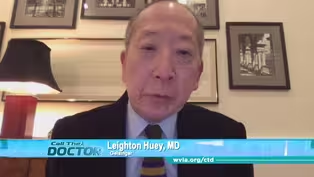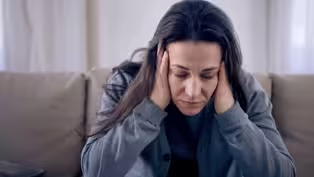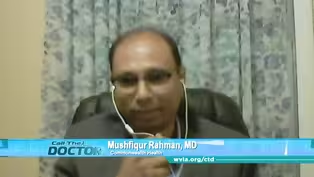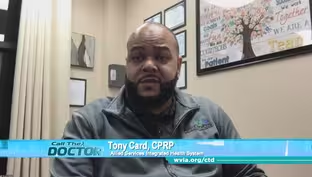Call The Doctor
Mental Health: Let's Talk About It
Season 33 Episode 11 | 25m 16sVideo has Closed Captions
It affects how we think, feel, act, how we relate to others, make choices & handle stress
Mental health affects how we think, feel, and act. It also determines how we relate to others, make choices, and handle stress. Medical research shows that each year, one in five adults in the United States experiences some kind of mental illness, and one in six children between the ages of six and 17 are living with a mental health issue.
Problems playing video? | Closed Captioning Feedback
Problems playing video? | Closed Captioning Feedback
Call The Doctor is a local public television program presented by WVIA
Call The Doctor
Mental Health: Let's Talk About It
Season 33 Episode 11 | 25m 16sVideo has Closed Captions
Mental health affects how we think, feel, and act. It also determines how we relate to others, make choices, and handle stress. Medical research shows that each year, one in five adults in the United States experiences some kind of mental illness, and one in six children between the ages of six and 17 are living with a mental health issue.
Problems playing video? | Closed Captioning Feedback
How to Watch Call The Doctor
Call The Doctor is available to stream on pbs.org and the free PBS App, available on iPhone, Apple TV, Android TV, Android smartphones, Amazon Fire TV, Amazon Fire Tablet, Roku, Samsung Smart TV, and Vizio.
Providing Support for PBS.org
Learn Moreabout PBS online sponsorship- Mental Health, Let's Talk About It, coming up next on Call The Doctor.
(dramatic music) - [Narrator] The region's premier medical information program, Call The Doctor.
(dramatic music) - Mental health affects how we think, feel and act.
It also determines how we relate to others, make choices and handle stress.
Someone who's living with a mental illness could feel the effects in their mood or behavior.
Mental health is important at every stage of life.
Medical research shows that each year, one in five adults in the United States experiences some kind of mental illness, and one in six children between the ages of six and 17 are living with a mental health issue.
Some early warning signs include feeling helpless or confused or severe mood swings that cause problems in relationships.
The COVID-19 pandemic is contributing to mental health issues by creating feelings of isolation.
Some examples of mental illnesses include; obsessive compulsive disorder or OCD, hallucinations, persistent feelings of sadness or anxiety and bipolar disorder.
The treatment depends on the type of illness and its severity.
Many people find a combination of treatments works best.
Mental health, Let's Talk About It now on Call The Doctor.
Mental health, Let's Talk About It, welcome to Call The Doctor here on WVIA.
I'm Paola Giangiacomo.
Tonight our topic is mental health and its services.
Joining us on the panel Tony Card.
He has a program manager at Allied Services Integrated Health System.
Dr. Mushfiqur Rahman is a psychiatrist with Commonwealth Health, and Dr. Mushfiqur Huey.
He is the associate Dean professor of psychiatry, director of behavioral health for Geisinger School of Medicine.
And I would like to remind our viewers that you can participate in the conversation at wvia.org/ctd.
You can also submit your questions for future shows by emailing ctd@wvia.org or using the hashtag WVIACTD.
And be sure to check our website for a listing of future programs and watch call the doctor episodes any time on the WVIA app.
Now we'll begin our discussion.
First of all, thank you all for joining us to talk about mental health.
Let's start off with you, Dr. Huey, what are some mental health issues?
- Well, I'm gonna answer that in the context of COVID.
I think that the results from the household pulse survey which is from the National Center for Health Statistics and the Census Bureau which was implemented after COVID started last year is suggesting that the proportion of adults with anxiety and depression has quadrupled during the course of the presence of COVID in this country.
So this is a major issue that is, needs to be addressed and that's what I think we're gonna be talking about tonight.
- Yes, and it's been noted that COVID-19 is creating this loneliness epidemic.
Would you agree Dr. Huey?
- Yeah, and of course it's understandable that with lockdown and isolation, especially with kids and with adults, that people are going to feel anxious, they're going to feel sad because they're not used to being in this present state.
Now, not everybody who experiences that necessarily needs to have professional treatment, because it's a normal process of reaction to what's been going on in our society.
All of our anchor points have been disrupted as a result of COVID.
So people who understand that and they utilize ways to deal with healthy things in their lives, connecting with others, maintaining a certain routine, things like that, may not need professional treatment, but those people who are vulnerable, who have pre-existing conditions, those are the individuals who may experience problems.
- Well, so let's talk about those people, Dr. Rahman, who might be at risk, those with, like Dr. Huey said pre-existing conditions.
What kinds of pre-existing conditions would make loneliness even worse?
Dr. Rahman.
- Patients who have history of anxiety disorder, patients who have these, can you hear me?
- [Paola] Yes.
Patients who have anxiety disorder, patient who have previous diagnosis of depression and even with history of substance abuse, they are the most vulnerable, people who have significant stress with their finances because of COVID or people who are isolated and unable to talk to their loved one, they're also vulnerable.
These are the underlying diagnosis that becomes much more difficult during this period of pandemic.
- Could what you described also be a consequence of loneliness for people who may not already have these pre-existing conditions, Dr. Rahman?
- It can be, loneliness can be very difficult to deal with.
And as a human being, we like to connect with each other.
So that can be a kind of a reason for patient heavy anxiety and depression.
However, people who have already anxiety and depression and speaking mental health, not having that direct contact with their peers and their therapist or their psychiatrist also has become a significant problem for them.
And we often see them, they're coming in to the inpatient setting, like in my unit, many of them complain that because they are not able to see their therapist and their psychiatrist directly face to face that has impacted their recovery from depression or anxiety or even substance abuse.
- Yes.
Tony Card, you are a mental health technician.
So how has the pandemic affected your day to day with patients?
Are these patients, are they doing well with Zoom?
- So a lot of our patients usually go to groups and stuff that are no longer available to them.
So they're starting to feel the isolation and their inability to connect with their peers.
- Okay.
And how are they able, if they don't have group therapy, what are they doing to get help?
- We try our best in the group home settings to make staff, supervisors and counselors available to talk to them and work through their, some of the issues that they're having.
- Dr. Huey, do you find that telemedicine is an advantage or can it be a disadvantage for some people?
- Well, I wasn't sure about that when telemedicine began, I was concerned that the losing the direct contact with individual people would be problematic, but there are a lot of people who like telemedicine because it's more convenient for them.
So that's one positive aspect about it, but I still think the direct contact with patients, and many patients will say, "Well, when are we gonna start having direct contact again?"
And I understand where they're coming from with that.
You can certainly see some things that you may not be able to see through a monitor when people are live in your office and coming in.
And so part of this, from the medical school point of view and residency training point of view is helping medical students and residents experience telehealth, and the contrast between that and kinda live by patient and family interviews.
- Dr. Rahman, what is the difference between feeling depressed or just feeling a little blue?
How would one know that they are clinically depressed as opposed to just feeling blue?
- So one of the way to separate between just feeling a little depressed or someone is diagnosed with major depression is their functionality and the duration of that feeling blue and sad and not enjoying things that they used to enjoy before.
So the duration is usually two weeks.
And if there is significant impairment of functioning, like if they're a student they're not doing well with their study, if they're working in a job, they are not performing well, in their relationship with their spouse if they're not functioning well there, then we can think that they are having some underlying major depression, just not the blue.
And then also if there is any feelings of suicidality or feeling of suicidal or not living anymore, that is much more severe and we fairly can say that they are suffering from major depression.
- And what treatments would be available for someone suffering from depression, Tony?
- So there are inpatient psychiatric treatment, there's outpatient psychiatric treatment.
If it's a huge impairment, there are group homes available.
We provide services that teach the skills that they may have lost due to the depression.
- Okay.
And if there are patients who can't access group therapy, what other alternatives, I know there's medication, but are there alternatives to medication that people could do just in their everyday lives to just feel better, Dr. Huey?
- Well, you know, 25% of adults don't receive the care that they need in this country in terms of psychiatric services.
So there is a kind of, and this is an under-resourced area of the country, Northeastern Pennsylvania in terms of psychiatric services.
So ideally there would be a continuum of care for people needing support and psychiatric services, which could range from groups as was mentioned to individual therapy, to individual therapy plus medications and other forms of treatment.
But the key to any successful treatment is a careful diagnostic approach to really understanding the individual, their background, family history, genetic predisposition, things like that.
So COVID has disrupted, as I said earlier, the social determinants of health that involve employment, income levels, education and so forth, and kids are especially vulnerable to this disruption.
And so suspension of social activities for kids and adults is really a big factor.
Stress from parents who are worried about income levels and job contribute to what goes on in the family.
So there are a lot of things that are in the fallout that are occurring that are going to be here for quite some time that are gonna be important to address.
- So how can we help children who might be suffering as well?
They see their parents stressed or children may not be doing well with virtual, so the pandemic is obviously impacting children as well, how can children be helped during this time, Dr. Rahman?
- Well, obviously patient, the family and the parents have to be aware of it, that how this isolation can impact their children.
And often we can see the overt signs at home.
Like if the kid are becoming irritable, angry and there is a change of behavior, and in that case, we can seek help with the community mental health team or we can also go out and ask help from the school counselor.
But the most important thing for the parents to identify the symptoms, if it is just a adjustment problem or there is an underlying psychiatric problem So just being educated and aware of the mental health symptoms and signs and if there is any acute situation, like if it is trying to hurt themselves or agitated enough to hurting other people, then immediately looking for the 911 call or the crisis phone number, to call the crisis phone number, those are the options available.
So I'll summarize it like to go to this school counselor, if not, then also calling the crisis phone number to seek out help there.
- Is that in the case of, let's say a mental breakdown, they should call an expert or go to their ER?
- Exactly.
Yeah, so I'm saying that, exactly.
So ER should be the last result, so if there is a gradual change of the behavior, they can always go up to the school counselor.
If things are out of hand and the patient has concern and there is a breakdown, immediately patient, the children should be brought into the ER or at least crisis on number can call.
- In terms of adults, how one know when they need to be admitted to an inpatient facility, Dr. Huey?
How bad do things have to get before someone has to be admitted?
- Well, admission requires, you know, a careful scrutiny obviously.
Somebody who is a danger to themselves or to others or somebody who is incapacitated and not provide food, clothing and shelter for themselves in terms of activities of daily living, those would be kind of the three areas that would require admission.
Now, there are oftentimes people who are admitted but they don't need to be admitted to the hospital or if somebody is feeling anxious because of what's going on with COVID, that doesn't necessarily mean that they have to see somebody professionally.
It may be that they need reassurance, if the parents are tuned in to their kid, if the kid is anxious to reassure them, to have them engage in social activities with and can be virtual with their peers, something that will resume normalization in their lives, that can be very helpful, and not require being seen by a professional.
But this fallout is predicted to go on for some time because some people have said that the fourth wave in COVID is going to be mental health.
And we've seen from the statistics that are coming out from the Household Pulse Survey that I mentioned at the beginning of this program, that this may be something that's gonna go on for some time and needs to be addressed.
- Have you seen an increase in antidepressants?
- Well, antidepressants are certainly useful medications.
And during this time with anxiety and depression, increasing identifying those individuals who would benefit from antidepressants will be important, but not everybody needs to be on medications.
I mean, there are non-medication approaches, as I mentioned psychotherapy, supportive care, group therapy, that can be very effective with especially milder cases of anxiety and depression.
- But what else can people do besides psychotherapy or group therapy or therapy at all?
Is there just maybe changing your scenery or going outside for a walk or maybe yoga or meditation, Dr. Rahman, would you suggest any of those activities?
- Absolutely.
All those activities are very helpful.
Exercise itself is very important, and it helps significantly with stress reduction and also with depression.
Reaching out to other people, talking to loved ones, going out for a walk or even walking the dog or just going out to the park itself will help a lot.
I think those are very, very excellent ideas to create this depression anxiety, and obviously during this period of anxiety with Covid.
- As a medical health technician, Tony, would you agree on these alternative forms of therapy?
- Yes, definitely.
I mean, we try and get the consumers in the group homes out if it's a walk around the block or, you know, even just a ride in the car just to get out of the household setting and into the community for change of scenery.
- Tony, are you finding loneliness being a problem with your patients as well?
- Definitely.
Our consumers living in a communal setting, our consumers are definitely starting to have conflict with each other just because they're constantly in the communal settings, their symptoms are starting to worsen and we're working with their outpatient providers to decrease those symptoms and working with them to find a mutual understanding in the homes.
- Dr. Huey, what can family members or friends do to help if they notice one of their family members or friends having a tough time right now?
- Well, I think talking with that individual is gonna be important.
If the behavior or the thinking has changed from what is usual and customary for that individual, that's signifying something.
And the other things that we have not talked about yet is that it's not only anxiety and depression that has increased, quadrupled in the proportion of adults, it's also substance use has increased, domestic violence has increased, the number of crisis calls coming into hotlines.
For example, in Los Angeles, the crisis calls have increased by 8000% during COVID.
So that's saying that people are really hurting and the resources needed to help them are gonna be very important.
- So what can we do as a society to help these people overcome some of the issues that they're going through right now?
I mean, there is hope in the future with the vaccine rollout but who knows how long this could go on Dr. Huey?
- Well, the mental health fallout is predicted to remain in place for some time.
And so that's why the training of new people in behavioral health, psychiatrists, psychologists, social workers, counselors and so forth is going to be very important.
I mentioned before Northeastern, Pennsylvania, I think is considered to be an under-resourced area in terms of behavioral health services and putting together a continuum of care that makes sense, that can address the issues that we're talking about tonight and it's gonna be really important.
One size doesn't fit all, being able to individualize treatment, recognizing the family constellation, the individual perspective is all important in identifying and creating a comprehensive treatment plan for that individual, and that requires a lot.
- How does one go about finding care?
Whether it's a psychologist or a psychiatrist, how does one make that first step, Dr. Rahman?
- So yeah, most of the county have their community mental health center.
Even if someone just starts in the Google with their county, they can find resources.
And people don't have to have insurance for seeking out mental health as well, because those are county funded mental health center, they can get help there.
I work for Commonwealth Health in First Hospital, and we have a lot of patients who come to the crisis to our inpatient setting who do not have any health insurance, and we offer them, we hook them up with outpatient psychiatric service, like community counseling service in Wilkes-Barre, also in Burke center in Tunkhannock, Scranton Counseling Center in Scranton.
We also have substance abuse kinda outpatient therapy and medical assistant treatment for opiate addiction.
So we have Choices Outpatient, which is again part of Commonwealth Health.
They provide Suboxone therapy as well as methadone therapy.
We also have a crisis unit works 24/7 in Wilkes-Barre General Hospital.
So even in a crisis, they can always go to Wilkes-Barre General Hospital and the care can be more faster in that way, that they can be hooked up with a community mental health center there.
Besides that people who have commercial insurance, they can always search to their insurance to find out therapists and psychiatrists who provide care for them.
- Okay.
And if people need medication, would it be for long-term Dr. Huey or would they be able to get weaned off of that?
- Well, it depends whether they have a prior history of say depressive disorder or bipolar disorder that you mentioned at the start of the program.
For some people who have recurrent episodes of depression or psychosis, they likely will need long-term medication treatment.
But it's not just medication, it should be with supportive care, with therapy, sometimes family therapy is going to be effective there as well.
So some people will need long-term care, but some people may not.
This reaction to the pandemic with anxiety and depression maybe short-lived for some people, especially if they practice things that are going to reestablish their social network, especially as as lockdown begins to kind of, we move out of lockdown, getting back to usual social activities and things like that, especially for kids.
- Okay, well, this was all very informative.
Thank you all for joining us.
Once again, I would like to thank our panelists for participating in our discussion on mental health.
For more information and resources on this topic, visit wvia.org/ctd.
I'm Paola Giangiacomo for Call the Doctor, thank you for watching.
(upbeat music)
Video has Closed Captions
Clip: S33 Ep11 | 35s | Leighton Huey, MD - Geisinger (35s)
Mental Health: Let's Talk About It - Preview
Preview: S33 Ep11 | 30s | Watch Wednesday, March 3rd at 7:30pm on WVIA TV (30s)
Video has Closed Captions
Clip: S33 Ep11 | 32s | Mushfiqur Rahman, MD - Commonwealth Health (32s)
Video has Closed Captions
Clip: S33 Ep11 | 26s | Tony Card, CPRP - Allied Services (26s)
Providing Support for PBS.org
Learn Moreabout PBS online sponsorship
- Science and Nature

Follow lions, leopards and cheetahs day and night In Botswana’s wild Okavango Delta.

- Science and Nature

Explore scientific discoveries on television's most acclaimed science documentary series.












Support for PBS provided by:
Call The Doctor is a local public television program presented by WVIA



